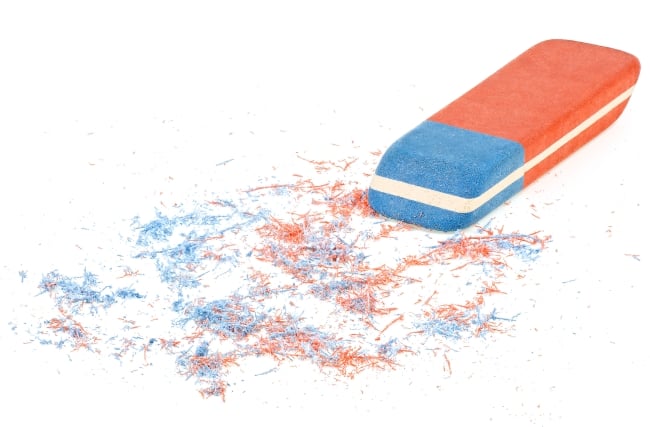You have /5 articles left.
Sign up for a free account or log in.

domnicky/iStock/Getty Images Pllus
Nothing is like the feeling of settling down with a (digital) stack of 30 papers and grading them. Unfortunately, it is an awful feeling. In an era when higher education feels more transactional than ever, countless voices in and outside the academy are railing against the dangers of grade inflation, and students and faculty members alike are as alert as squirrels to the inevitability of bias, the dread of grading has only gotten worse.
When I first started, I could barely keep all of my anxieties about quantifying these deeply personal essays at bay. Sixteen years of teaching have taught me that quantifiable grades can be intellectually stifling, unfair, deeply stressful, unequal, unkind and often conform to a status quo I want my students to question. During the pandemic, as I entered online teaching for the first time, facing a screen full of disappointed first-year students trapped in their bedrooms, I forced myself to ask, “Why am I doing this?”
So I stopped grading in 2020 and made students determine their own final grades through reflective self-assessment, and I’ve never looked back. What are grades, anyway? As a wave of assessment washes over higher education, grades feel less important than ever. They certainly feel antithetical to my pedagogical values.
Students are often consumed by the desire for a 4.0 or desperate for grading curves to pull them out of mediocrity and obscure the meaning of those grades. Others are anxious about meeting my opaque expectations, struggling to write what they think I want to hear rather than nurturing whatever passions our coursework might spark for them.
The fear of numbers either locking or unlocking the doors of graduate school and law school, or compromising their financial aid, means that the anxieties of measurable achievement arrive with students to campus before they ever step foot in my classroom. Students have been trained since elementary school to reach benchmarks, conform to external expectations and quantify their intelligence. I am uncomfortable contributing to that.
Ungrading is about unlearning those problematic paradigms. I used to hate that term, ungrading, but writing this essay has convinced me it productively signifies positive action. If grading is unfair, unsettling and unkind, perhaps ungrading can be fair, settling and kind. Saying, “I don’t grade” is negative and passive. “Ungrade” is an active verb, a choice that acknowledges my participation in a project that challenges the hegemony of quantitative metrics as the essential arbiter of student success.
After four years, these four powerful benefits of ungrading sustain me, as it:
- Nurtures creativity and risk-taking. Once my first-year writing students realized that I meant it, ungrading inspired research projects they said they would have never felt comfortable pursuing.
- Fosters intellectual growth. In my Music of Africa class, in which students also determined the course content, their freedom to prioritize what mattered to them contributed to work that they took real pride in and hoped to take with them to future classes (as expressed in course evaluations).
- Prioritizes student well-being and mental health. The sighs of relief from first-year students already anxious about the future was palpable. My students are increasingly open with me about needing mental health days and often identify the safety net of ungrading as what allows them to effectively balance their mental well-being with the demands of college.
- Creates intentional space for students historically left out of higher ed. I’ve had students of color openly acknowledge the kindness of ungrading as key to rebuilding their intellectual self-esteem and making the classroom a space in which they belong.
I teach to inspire curiosity, creativity, responsibility and hope; I ungrade in the service of intellectual freedom and risk taking. I want to awaken students to the wonders of music and recognize how important collective creativity can be to human flourishing. I want them to feel safe enough to take intellectual risks and recognize the positive impact they can have on the world around them if they nurture their capacities for critical thinking, listening and dialogue.
At its best, ungrading helps create a classroom community in which we trust one another to embark on the journey of the semester in tandem. At the close of my most recent writing seminar, my students promised each other to maintain their WhatsApp group and sustain that feeling of community they had fostered during the semester. Surpassing their own expectations supplanted satisfying mine as they completed their assignments.
When I began, I saw ungrading as an essential step in overcoming the biases embedded in higher education, but I don’t think it resolves much on its own. I want students to trust me and feel safe, but safe spaces can’t be asserted—they have to be nurtured and earned. Outsourcing the confrontation with implicit biases to the students themselves when they assign their own grades doesn’t absolve either of us of our responsibilities, but does put students at the center of the conversation. This is a lot for some students to handle, so I now let them opt out and request that I grade them myself if the very act of ungrading is what is stifling them.
Ultimately, ungrading is a project of hope. I do it to foster creativity, conviction and joy in student work that can ideally change how both of us think. It is not wishful thinking, but a commitment to working toward aspirational goals and ideals. I am convinced that, when done well, ungrading is good for students both intellectually and emotionally.
The happiest by-product for me is that I trust my students now more than when I graded them. When I first leaped into the ungrading pool, I was convinced that a significant percentage of my students would realize my worst fears by skipping class and phoning in assignments because the carrot was now so much bigger than the stick. I expected it to crash and burn. Imagine my surprise when that didn’t happen. I started this in the hope of demonstrating to students that I could be trusted to treat them fairly and kindly, but in fact they demonstrated to me that they could be trusted to take ownership of their own daring intellectual growth.
If you’re burned out on grading because it feels punitive, unfair, stifling or arbitrary, I would encourage you to simply stop. Of course, if you’re teaching a class with 150 students potentially bearing scars from decades of reductive grading, less radical alternative grading steps like labor, mastery, specifications or portfolio grading may be more palatable. I recognize how blessed I am to have small classes, eager students and institutional support.
Yet there is no greater feeling as an educator than trusting students to commit to their own intellectual growth and watching them surpass those ambitious expectations. Grading is often dismissed during our own campus’s many assessment workshops and mandates. “That’s not real assessment,” they say. So why do it?
Now, when I open that stack of papers, I focus on revealing what they did well, identifying the directions their thinking could go next and acknowledging areas of growth and revision. It energizes me to keep teaching, and nowadays, anything I can do to help alleviate the anxiety that more and more students bring to class, the better I feel about the work I do. It is more work for sure, but better work, and at its best it can realize the ideals of higher education.








